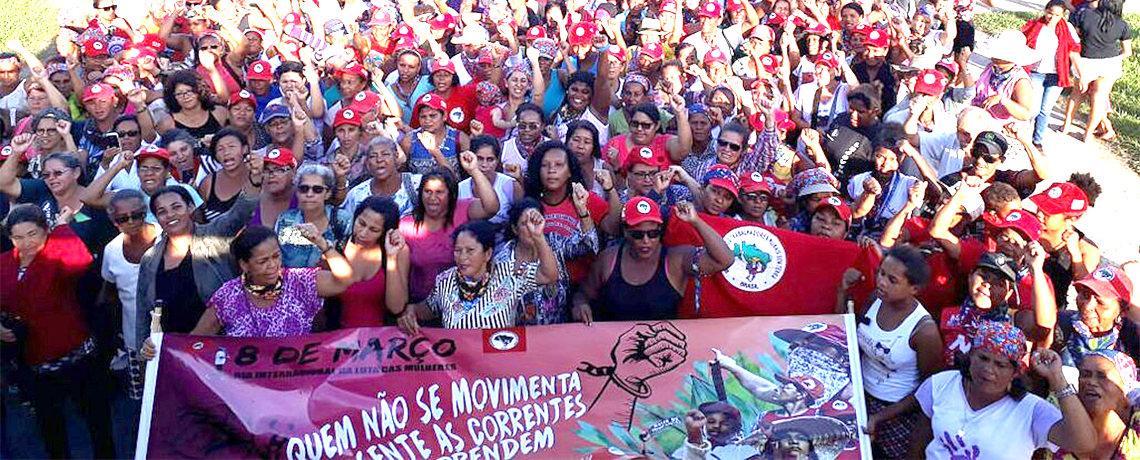 Caption: Women of the Brazil Landless Worker’s Movement (MST) march against timber company Suzano and industrial tree plantations on International Women’s Day. Photo courtesy: MST
Caption: Women of the Brazil Landless Worker’s Movement (MST) march against timber company Suzano and industrial tree plantations on International Women’s Day. Photo courtesy: MST
Note: The following introduction was written to launch the open letter the the IUFRO World Congress attached below it (in English, Spanish and Portuguese). The open letter was written by a network of groups in Brazil that have united around opposition to industrial tree plantations; and to the historic and ongoing displacement of communities–Indigenous, Quilombola (Afro-Brazilian), peasant and others–from their territories to make room for the expansion of these eucalyptus and pine plantations in Brazil. The Open letter denouncing the International Union of Forest Research Organization and their promotion of industrial forestry at any cost was disseminated today, on the opening day of the IUFRO World Congress in Curitiba, Brazil. The idea for the open letter was initiated at a meeting in Porto Alegre, Brazil last April of groups and individuals representing the plantation-impacted regions in Brazil. This meeting was organized by World Rainforest Movement and Friends of the Earth Brazil and co-sponsored by Global Justice Ecology Project.
To the IUFRO World Congress: Plantations Are Not Forests!
The World Congress of IUFRO (International Union of Forest Research Organizations) launches today September 29 through October 5. In this event – organized by the Brazilian federal government and that has the UN Food and Agriculture Organization (FAO) among its sponsors – companies, researchers and governments will meet to discuss “technological innovations, as well as to stay up to date about the latest research findings and trends for the future of forestry and forest research in all areas of the world”. However, the “forest research” promoted by IUFRO focuses on encouraging industrial tree plantations, promoting transgenic trees and publicizing false solutions to the climate crisis such as “carbon storage” in tree monocultures.
The invasion of transnational cellulose companies in traditional peoples and communities’ territories has significantly intensified conflicts in the rural areas, putting at risk food security and destroying livelihoods. The millions of hectares of land that were used for exotic tree plantations, implemented in Brazil by transnational companies, are identified under the false name of “reforestation”. In fact, monoculture tree plantations mean true green deserts that have drastically impacted the socio-biodiversity of the country.
Considering the expansion of exotic tree monocultures and knowing about its impacts, organizations around the world are united in rejecting the IUFRO World Congress, stating emphatically: Plantations are not Forests!
Open-letter-IUFRO-September-21st-2019
Carta-Publica-IUFRO-21-de-setiembre-2019-español
Carta-Publica-IUFRO-21-Setembro-2019
Open letter signatories:
Agapan
Amigos da Terra Brasil
Apa Sto Antonio
APISBIO
Associação Brasileira de agroecologia
BiomaBrasil
Campanha Nacional em Defesa do Cerrado
Centro de Estudos Ambientais (CEA)
CIMI – Conselho Indigenista Missionario
Comitê dos Povos e Comunidades Tradicionais do Pampa FASE
Fase-MT
Fórum Carajas
Fórum da Amazônia Oriental – FAOR
Fórum Mudanças Climáticas e Justiça Socioambiental Fundação Brasilhoeve
Fundação Luterana de Diaconia – FLD
INGÁ – Instituto Gaúcho de Estudos Ambientais
Marcha Mundial das Mulheres
Movimento Ciência Cidadã
Movimento dos Atingidos por Barragens (MAB) Movimento roessler
Rede Alerta contra o Deserto Verde-RJ
Rede Jubileu Sul Brasil
SOF Sempreviva Organização Feminista
Terra de Direitos
União Protetora do Ambiente Natural – UPAN
Supported by:
ADECRU, Mozambique
Adéquations, France
Amigos de la Tierra América Latina y el Caribe -ATALC, Colombia
Amigos de la Tierra Argentina, Argentina
Amigos de la Tierra Internacional, Internacional
ARA, Germany
Asociación Amigos de los Parques Nacionales, Argentina
Asociación indígena niviribotdä, Costa Rica
Biofuelwatch, United Kingdom
Bread for all, Switzerland
Campaign to Stop GE Trees, International
CENSAT Agua Viva, Colombia
Center for Environment/ Friends of the Earth Bosnia and Herzegovina, Bosnia and Herzegovina Centro rescate de primates, Argentina
CESTA, Amigos de la Tierra El salvador, El Salvador
Chilamate Rainforest Eco Retreat, Costa Rica
CODEFF, Chile
Coecoceiba – Amigos de la Tierra Costa Rica, Costa Rica
Collectif pour la défense des terres malgaches – TANY, France
Conscientia instute, Finland
Denkhausbremen, Germany
EcoActors Nigeria, Nigeria
Ecore Equipo de Colaboración y Reflexión, Honduras
ETC Group, Mexico
Forum Environment and Development, Germany
Forum Ökologie & Papier, Germany
Friends of the Siberian Forests, Russia
FUNDECONGO, Costa Rica
Global Justice Ecology Project, USA
Grupo Guayubira, Uruguay
ICRA International, France
Indigenous Environmental Network, US
International Care, United Kingdom
Jordens Vanner – Friends of the Earth Sweden, Sweden
Just Forests, Ireland
Kimhunter.ca, Canada
Livonsaari community village, Suomi
Maderas del Pueblo del Sureste, AC, Mexico
MISSAO TABITA, Moçambique
Muyissi Environnement, Gabon
Naturwald Akademie Germany, Germany
Oasis Earth, USA
OLCA – Observatorio latinoamericano de conflictos ambientales, Chile
Otros Mundos/Chiapas, México
Pro REGENWALD, Germany
PROYECTO GRAN SIMIO (GAP/PGS – España), Spain
PUIC-UNAM oficina Oaxaca, Mexico
Rainforest Relief, United States
RECOMA – Red Latinoamericana contra los monocultivos de árboles, Internacional Red de género y medio ambiente, México
REDES-AT Uruguay, Uruguay
Re-nourish, United States
Rettet den Regenwald e.V. – Rainforest Rescue, Germany
Salva la Selva, España
School for Democratic Economics (SDE), Indonesia
Social Justice Committee, United States
Society for Responsible Design, Australia
SUHODE Foundation, Tanzania
The Corner House, UK
Tribes and Natures Defenders Inc., Philippines
Union paysanne, Canada
Unión Universal Desarrollo Solidario, Spain
WRM – World Rainforest Movement, International
Youth Volunteers for Environment Ghana, Ghana
